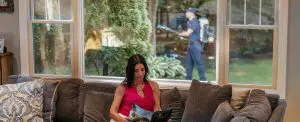

Pest management is of the utmost importance in the food service industry. Infestations jeopardize your hard-earned reputation and, more importantly, put the health and safety of your customers and employees at risk. Integrated Pest Management makes pest control easy, so you can be confident that your establishment remains pest-free and safe.
What Is IPM?
Integrated Pest Management, or IPM, is an environmentally-friendly and risk-averse approach to pest control. The aim of IPM is to eradicate pests while limiting pesticide use and posing the least possible danger to people, pets, property, and the environment. It utilizes the most up-to-date scientific knowledge about pests and how they interact with their surroundings. This information is used in conjunction with common-sense practices to provide the most economically effective and least hazardous pest management possible. IPM eliminates the pests as well as the environmental conditions that allow them to thrive.
Food Service Pests and the Risks They Pose
- Ants are very common in the food service industry because they can reach virtually anywhere and they will eat almost every kind of food. They are not quite as serious of a risk as many other pests, but they can still contaminate food. In addition to the bacteria they can carry, dead ant carcasses tend to pile up in infested areas.
- Birds can cause considerable damage to roofs and gutter systems with their nesting habits. Their presence can also introduce new pests like bird mites, fleas, and some beetle species. Their main hazard, though, is their droppings. Bird droppings are poisonous, containing pathogens like E.Coli, Salmonella, and more. When bird droppings dry, they become powdery and can be blown around in the wind, contaminating every surface the particles land on.
- Cockroaches, like ants, will eat just about anything and can reach most places. What makes them some of the most hated pests, though, is the incredible health risk they pose. Cockroaches have been known to carry as many as 33 kinds of bacteria, 7 human pathogens, and 6 species of parasitic worms. What’s more, they reproduce at a rapid rate, making their populations very resilient.
- Flies are frequently a problem in the food service industry, and are some of the most visibly active pests. They are very unclean, and are known to carry more than 100 different pathogens. They spend a lot of time searching for food in places like garbage cans and animal carcasses, all the while gathering germs on their bodies. They then spread those germs everywhere they land. Additionally, they tend to use the bathroom while eating or resting, and some species even regurgitate digestive fluids. Needless to say, flies pose a serious health risk.
- Rodents are some of the most dangerous pests because they are a health hazard as well as a safety hazard. They contaminate every surface they touch with their droppings, urine, and fur. They also carry various diseases and parasites. Besides contaminating surfaces and foods, rodents can also cause considerable damage with their constant chewing. They chew through almost anything, including electrical wires.
- Stinging and Biting Insects pose a problem for any outdoor dining areas. Mosquitoes, besides being a nuisance, can carry diseases. Stinging insects like wasps pose a safety hazard to customers and employees, especially those who are allergic to stings.

How Can IPM Help?
Each IPM plan is built specifically to target only the pests it is meant to eliminate. By using pest-specific methods, all unnecessary pesticide use is eliminated and the vermin are taken care of with the least possible disruption to your business. IPM is, as its name implies, integrated into the day-to-day goings on of your establishment.

Prevention Tips
- Your staff are your first line of defense when it comes to preventing pests. Make sure to train your employees in proper pest prevention, as well as what signs to look for and report.
- Keep all food prep and food storage areas neat. Clean up food residue, clean all equipment thoroughly and regularly, properly dispose of food waste, don’t leave dirty dishes out overnight, and try to keep clutter to a minimum.
- Store all food and ingredients in air-tight containers made of materials that cannot be chewed through, like hard plastic or metal. Keep stored food at least six inches off of the floor and away from the walls.
- Empty all indoor garbage cans each night, especially those that hold food waste. Make sure all outdoor garbage cans have tight-fitting lids and keep all garbage areas clean. If possible, keep outdoor garbage cans at least a short distance away from your establishment- the further the better.
- Inspect all incoming packages and boxes for pests. Check all of the contents of each package as well. Many pests, like cockroaches, are introduced to facilities because they were living in the cardboard boxes used for packaging.
- Seal equipment and appliances to the floor, or elevate them at least six inches.
- Eliminate all possible entry points. Fix foundation cracks, replace missing shingles, seal holes in walls with caulk or steel wool, close any gaps around doors and windows, and place covers over vents and chimneys.
- Have any leaks and clogs fixed promptly.
- If possible, create a gravel or rock perimeter around your establishment.
- Monitor for any evidence of pests or pest activity. In addition to routine monitoring, continue to schedule regular inspections and, if necessary, treatments.
Wondering if there’s a pest control service plan that will work for you? Give Excel a call today to schedule a free inspection. We’ll work with you to build a pest management plan that is tailored to your establishment’s unique set of needs, and scheduled to avoid interrupting your business’s daily happenings. With your custom-built IPM plan, pests won’t stand a chance.






